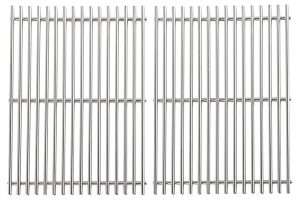If you own a Weber grill, then you made the right choice because Weber grills are one of the best grills you can ever get. However, with time, you may experience the need to replace your Weber grill grates.
The good news is that you can always have access to a wide range of top Weber grill grates. Here are some of the common types of grill grates you might want to try out.
Types of Weber Grill Grates
- Porcelain-Coated Cast Iron Grates: Cast iron grates provide excellent heat retention and distribution. The porcelain coating helps prevent sticking and makes cleaning easier. These grates are known for producing nice sear marks on your food.
- Stainless Steel Grates: Stainless steel grates are durable, resistant to rust, and easy to clean. They heat up quickly and are suitable for a variety of cooking styles. However, they may not retain heat as well as cast iron.
- Porcelain-Enameled Steel Grates: These grates combine the durability of steel with a porcelain enamel coating. They are resistant to rust and easy to clean. They may not retain heat as well as cast iron but are a good option for many grilling applications.
- Gourmet BBQ System (GBS) Grates: Weber offers a Gourmet BBQ System on some of their grills, which includes a removable center section that can be replaced with various accessories. These accessories can turn your grill into a pizza oven, griddle, wok, and more.
- Cast Iron Griddle (for some models): breakfast foods, vegetables, and more. These griddles can be placed directly on the grates.
When choosing a grill with specific grates, consider your cooking preferences, the types of food you plan to cook, and the maintenance requirements of the grates. Regular cleaning and proper care can extend the life of your grates and enhance your grilling experience.
Why we believe Weber Grill Grates are the Best
- Durable Construction: Weber grill grates are built with durability in mind. They are often made from high-quality materials such as cast iron, stainless steel, or porcelain-coated steel, ensuring longevity and resistance to wear and tear.
- Excellent Heat Retention and Distribution: Depending on the material, Weber grates, especially those made of cast iron, excel in heat retention and distribution. This ensures that the grates get hot and stay hot, promoting even cooking and allowing for beautiful sear marks on the food.
- Versatility with Gourmet BBQ System (GBS): Weber offers a Gourmet BBQ System on some of their grills. This system includes a removable center section that can be replaced with various accessories, turning your grill into a versatile cooking station. Accessories include a griddle, pizza stone, wok, and more.
- Easy to Clean: Weber grill grates are designed to be easy to clean. Many models feature porcelain coatings that make food less likely to stick, and the grates can be cleaned with a grill brush or scraper. Some grates are even dishwasher-safe.
- Variety of Materials: Weber provides a variety of grate materials, including cast iron, stainless steel, and porcelain-coated steel. This allows users to choose a material that suits their preferences and cooking styles.
- Grill Marks and Flavor: Weber grates, especially cast iron grates, are known for creating distinct grill marks on food, enhancing the presentation. Additionally, the material can contribute to the overall flavor of the food being grilled.
- Compatibility with Accessories: Weber grates are often designed to be compatible with various accessories, such as grilling baskets and racks, further expanding the cooking possibilities.
Weber Grill Grates at Amazon

Also read>> Weber Spirit II E-310 Gas Grill Review– Everything You Need to Know
FAQs
When should I replace my Weber grill grates?
Knowing when to replace your Weber grill grates depends on various factors, including the type of grates, their condition, and your grilling preferences. Here are some signs that it might be time to replace your Weber grill grates:
1. Visible Wear and Tear: Check for signs of visible wear and tear, such as rust, corrosion, or significant deterioration. If the grates have become uneven or warped, it may affect cooking performance.
2. Rust or Corrosion: If your grates are made of materials like cast iron or plain steel and are not properly cared for, they may develop rust over time. While some surface rust is normal, excessive rust or corrosion that affects the structural integrity of the grates may warrant replacement.
3. Difficult to Clean: If your grates have become difficult to clean despite regular maintenance, it may be an indication that they are reaching the end of their useful life. Porcelain-coated grates, in particular, can chip or wear off over time.
4. Loss of Non-Stick Properties: Porcelain-coated grates are designed to be non-stick, making them easier to clean. If you notice that food is sticking more frequently or the coating has worn off in certain areas, it may be time to replace the grates.
5. Uneven Cooking Surface: Warped or uneven grates can result in an uneven cooking surface, leading to inconsistent cooking results. If you notice hot spots or difficulty maintaining an even temperature, consider replacing the grates.
6. Flavor Changes: Over time, grates can absorb flavors from previous cooks. If you find that your food is starting to taste off or like previous meals, it might be a sign that the grates are retaining unwanted flavors.
What are my Weber grill grates made of?
Weber offers a variety of grills with different types of grates, and the material of the grates can vary based on the specific model and series. Weber commonly uses the following materials for their grill grates:
1. Porcelain-Coated Cast Iron: Cast iron grates provide excellent heat retention and distribution. The porcelain coating helps prevent sticking, makes cleaning easier, and adds an additional layer of protection against rust.
2. Stainless Steel: Stainless steel grates are durable, resistant to rust, and easy to clean. They heat up quickly and are suitable for a variety of cooking styles. Stainless steel grates are often found in higher-end Weber grills.
3. Porcelain-Enameled Steel: These grates combine the durability of steel with a porcelain enamel coating. They are resistant to rust and easy to clean. Porcelain-enameled steel grates are commonly used in mid-range Weber grills.
4. Gourmet BBQ System (GBS) Grates: Weber offers a Gourmet BBQ System on some of their grills, which includes a removable center section that can be replaced with various accessories. These accessories, such as a griddle or pizza stone, are designed to fit into the GBS grates.
5. Porcelain-Coated Steel: Some Weber grills come with porcelain-coated steel grates. These grates offer a balance of durability, heat retention, and easy maintenance.
Do I need to clean Weber grill grates?
Yes, it is essential to clean Weber grill grates regularly to ensure optimal cooking performance, prevent the buildup of residues, and extend the life of the grates. Cleaning your grill grates is a simple but important maintenance task that can impact the flavor of your food and the overall functionality of the grill. Here are some tips for cleaning Weber grill grates:
1. Preheat the Grill: Before cleaning, preheat the grill on high for 10-15 minutes. This high heat will help loosen any food particles or residues on the grates.
2. Brush the Grates: Use a grill brush with stiff wire bristles to scrub the grates. Brush in the direction of the grates to remove any debris or leftover food. Weber offers specific grill brushes designed for their grates.
3. Use a Grate Cleaner: Consider using a specialized grate cleaner for more thorough cleaning. Weber offers grill grate cleaners that are safe for use on their grates. Follow the product instructions for the best results.
4. Soak Grates in Soapy Water: For removable grates, you can soak them in warm, soapy water for a few hours. This can help soften and loosen stubborn residues. After soaking, scrub the grates with a brush or sponge.
5. Avoid Harsh Cleaners: Avoid using harsh chemicals or abrasive cleaners that can damage the porcelain coating on some grates. Stick to mild dish soap, specialized grate cleaners, or a mixture of vinegar and water for cleaning.
Courtney is a professional grilling enthusiast who has spent a good portion of his life grilling and exploring different methods and techniques for preparing delicious meals. As he always says, creativity is key to preparing sumptuous meals.
